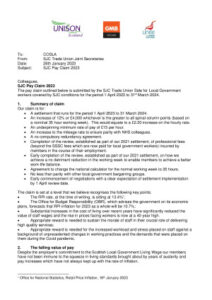 Our joint TU pay claim for 2023 has now been submitted to COSLA. The full version which contains our detailed arguments is attached.
Our joint TU pay claim for 2023 has now been submitted to COSLA. The full version which contains our detailed arguments is attached.
In summary our claim is for:
• A settlement that runs for the period 1 April 2023 to 31 March 2024.
• An increase of 12% or £4,000 whichever is the greater to all spinal column points (based on a nominal 35 hour working week). This would equate to a £2.20 increase on the hourly rate.
• An underpinning minimum rate of pay of £15 per hour.
• An increase to the mileage rate to ensure parity with NHS colleagues.
• A no compulsory redundancy agreement.
• Completion of the review, established as part of our 2021 settlement, of professional fees (beyond the SSSC fees which are now paid for local government workers) incurred by members in the course of their employment.
• Early completion of the review, established as part of our 2021 settlement, on how we achieve a no detriment reduction in the working week to enable members to achieve a better work-life balance.
• Agreement to change the national calculator for the normal working week to 35 hours.
• No less than parity with other local government bargaining groups.
• Early commencement of negotiations with a clear expectation of settlement implementation by 1 April review date.
The claim is set at a level that we believe recognises the following key points:
• The RPI rate, at the time of writing, is sitting at 13.4%[1];
• The Office for Budget Responsibility (OBR), which advises the government on its economic plans, forecasts that RPI inflation for 2023 as a whole will be 10.7%;
• Substantial increases in the cost of living over recent years have significantly reduced the value of staff wages and the rise in prices facing workers is now at a 40-year high.
• Appropriate reward is needed to sustain the morale of staff in their crucial role of delivering high quality services;
• Appropriate reward is needed for the increased workload and stress placed on staff against a background of unprecedented changes in working practices and the demands that were placed on them during the Covid pandemic.
